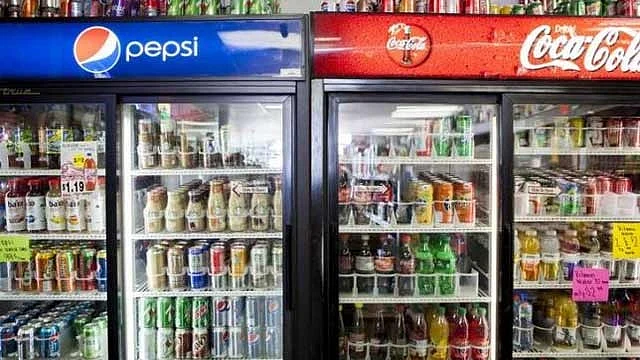
UAE Sugar Tax: Highly Sweetened Drinks To Pay More, Artificial Sweeteners 0%
The UAE's tax authority has provided more information as the country prepares to apply excise tax on sweetened drinks from 2026 onwards.
The taxation system will primarily rely on a 'tiered volumetric model', which links the excise tax imposed per litre of sweetened drinks to the sugar content per 100ml. This is based on sugar or sweeteners content rather than a fixed rate, as currently applied.
Recommended For You UAE President offers condolences to Saudi King over passing of Princess Nouf bint SaudFurthermore, the authority revealed that once the regulations come into effect, any sweetened drink not covered by a valid UAE Certificate of Conformity will automatically be classified as a high-sugar beverage until an authorised laboratory report is submitted confirming its sugar content falls below the threshold defined for this category.
Stay up to date with the latest news. Follow KT on WhatsApp Channels.
The Federal Tax Authority (FTA) has called on producers, importers, and stockpilers of sugar-sweetened drinks to begin reviewing the sugar content in their products in preparation for the implementation.
The transition to the new system is expected to take effect from the beginning of 2026, following the issuance of a legislation that is expected to define the rules and frameworks for its application.
What is a 'sweetened drink' as per law?For the new tax to be applied, the authority has clarified what is considered a 'sweetened drink'.
Under the new rules, a sweetened drink will be defined as a product to which a source of sugar, artificial sweeteners or other sweeteners is added that is produced for consumption as a drink, whether ready to drink, in the form of concentrates, powders, gels, extracts, or any form that can be converted into a sweetened drink.
Excise Tax will be calculated based on the total sugar content (natural sugar, added sugar, and other sweeteners) in the drink, if the drink contains added sugar or other sweeteners (such as honey).
However, drinks that contain only natural sugar without any added sugar or sweetener will not be subject to excise tax.
Meanwhile, drinks containing only artificial sweeteners, without added sugar or other sweeteners, will be subject to 0 per cent excise tax.
Carbonated drinks on the other hand will be abolished as a separate category of excise goods. Instead, the applicability of excise tax on these drinks will be determined based on their sugar content and categorisation as sweetened drinks.
Energy drinks will continue to be subject to the existing excise tax of 100 per cent of the excise price and will not be subject to the 'Tiered Volumetric Model'.
Under the new rules, sweetened drinks will be classified as follows:
- High-sugar drinks containing 8g or more of total sugar and other sweeteners, per 100 ml.
Moderate-sugar drinks containing 5g or more but less than 8g of total sugar and other sweeteners, per 100 ml. Low-sugar drinks containing less than 5g of total sugar and other sweeteners, per 100 ml.
Sweetened drinks that contain only artificial sweeteners.
While urging those eligible for the tax, the authority emphasised that early preparation would contribute to a smooth transition in applying the excise tax.
Once the legislation regulating the system comes into force, those subject to excise tax will be required to register sweetened drinks as excise goods after submitting a certified laboratory report accredited by the Ministry of Industry and Advanced Technology (MoIAT).
This report must show the sugar and sweeteners content as supporting documentation, or be classified as a high-sugar sweetened drinks.
The information has been made clearly available on the authority's website, in order to inform people of how to calculate the tax according to the new system, objectives, requirements, and the method for determining the sugar and other sweetener content in such drinks.
In order to avoid any negative impact on businesses, the FTA has been spreading awareness on the new system to help those eligible transition smoothly.
It emphasised its commitment to grant suppliers, importers, and other stakeholders sufficient time to prepare for applying the mechanism by reviewing their product compositions, updating their records with the FTA, and ensuring operational readiness.
UAE Certificate of ConformityExcise taxpayers have been urged to apply for the UAE Certificate of Conformity regarding the sugar and sweetener content in beverages online.
This certificate specifies the total sugar content (including natural sugars, added sugars, and other sweeteners) in sweetened drinks that are produced, imported, stored, or released from a designated area, and indicates whether the sweetened drinks contain artificial sweeteners.
The FTA further clarified that, under the rules expected to take effect in early 2026, a sweetened drink will be defined as a product to which a source of sugar, artificial sweeteners or other sweeteners is added that is produced for consumption as a drink, whether ready to drink, in the form of concentrates, powders, gels, extracts, or any form that can be converted into a sweetened drink.

Legal Disclaimer:
MENAFN provides the
information “as is” without warranty of any kind. We do not accept
any responsibility or liability for the accuracy, content, images,
videos, licenses, completeness, legality, or reliability of the information
contained in this article. If you have any complaints or copyright
issues related to this article, kindly contact the provider above.

















Comments
No comment